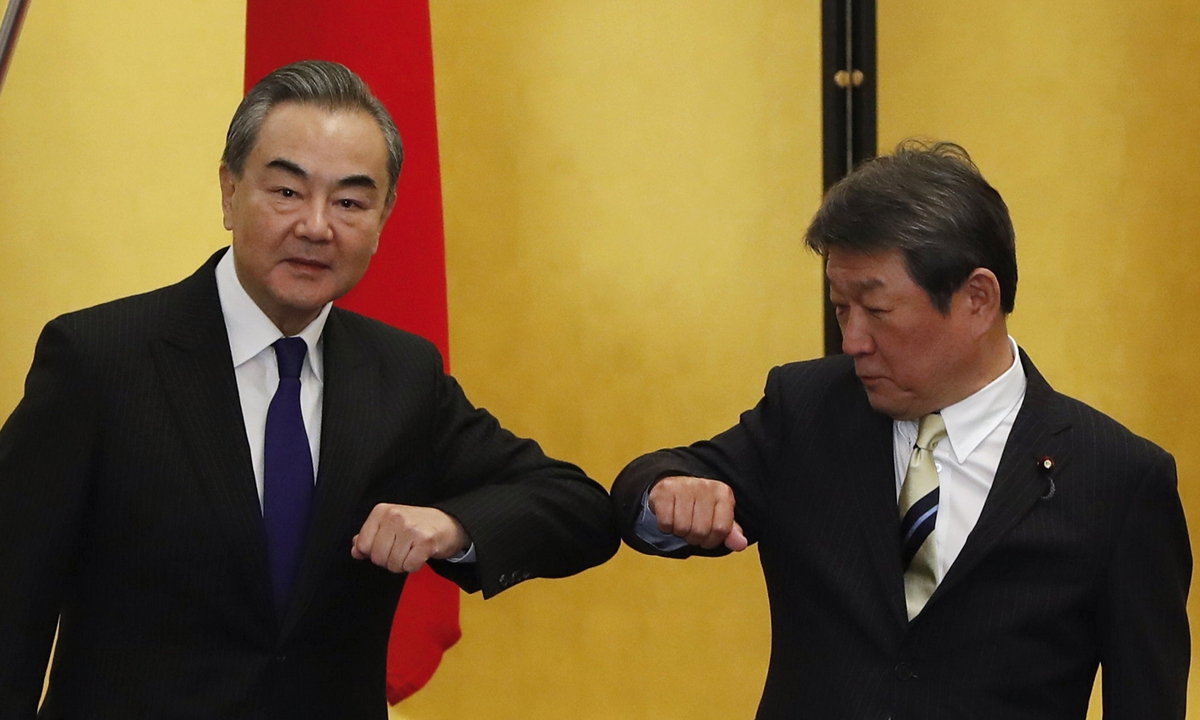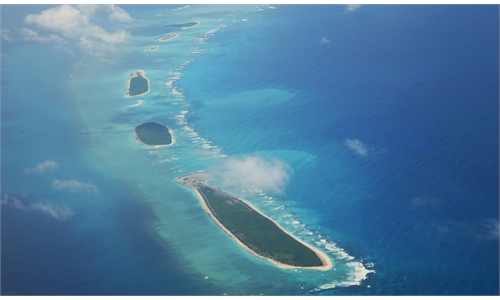
China's State Councilor and Foreign Minister Wang Yi (left) bumps elbows with Japanese Foreign Minister Toshimitsu Motegi at the start of their meeting in Tokyo on Tuesday. The two sides agreed to start a quick channel for personnel exchanges this month and hold a new round of China-Japan high-level economic talks next year. Photo: AFP
Chinese State Councilor and Foreign Minister Wang Yi's ongoing visit to Japan, one of the rare high-level bilateral exchanges to yield important and substantial results, laid a good foundation for the further stability and improvement of China-Japan relations as well as regional stability and economic integration, against the backdrop of the US' intensified anti-China policy, which has brought great strategic uncertainty to Northeast Asia, Chinese analysts said.
The strengthened economic cooperation and mutual trust between China and Japan would also restrain and dilute the US Indo-Pacific Strategy, with its military objective of containing China, analysts noted.
Chinese analysts believe the strengthened China-Japan ties were based on their need to promote regional stability and trade, and it was also a practical need for China as the current China-US ties were unlikely to significantly improve in the short term.
On Wednesday, during a meeting with Japanese Prime Minister Yoshihide Suga, Wang said China-Japan relations have finally returned to the right track after years of hard work, and the two sides should cherish this hard-won situation.
Wang said China is ready to work with Japan to build China-Japan relations that meet the requirements of the new era, and he called on both sides to establish actual mutual trust, properly deal with sensitive issues, and push forward regional cooperation.
Suga said that developing stable Japan-China relations is of great importance not only to both countries, but also to the region and the international community.
Wang was the highest-ranking Chinese official to have a face-to-face meeting with Suga, after the latter won the leadership of Japan's Liberal Democratic Party and became prime minister in mid-September.
Wang's meeting with Suga came after a meeting with Japanese Foreign Minister Toshimitsu Motegi on Tuesday, during which the two sides reached consensus on a wide range of issues, including fighting the COVID-19 pandemic, promoting economic recovery, and supporting each other in hosting the Olympic Games.
The meeting was the first face-to-face contact between the two foreign ministers since the outbreak of the COVID-19 pandemic.
Both sides agreed to make efforts for the early enforcement of the Regional Comprehensive Economic Partnership (RCEP), and to accelerate negotiations on the China-Japan-South Korea free trade agreement and regional cooperation.
On the Diaoyu Islands issue, Wang said that some Japanese fishing boats of unknown origin have repeatedly entered the sensitive waters of the Diaoyu Islands recently, which prompted China's necessary response.
Wang called on both sides to earnestly abide by the four-point consensus reached between China and Japan, avoid taking actions in sensitive waters that would complicate the situation, and timely and properly deal with problems.
Yang Xiyu, a senior research fellow at the China Institute of International Studies in Beijing, told the Global Times on Wednesday that the most important strategic significance of Wang's Japan visit was that it stabilized China-Japan relations, as the two countries have reached a crossroads at a time when rapidly deteriorating China-US relations have further complicated China-Japan relations.
The consensus reached by the two countries served as a stabilizer that laid a good foundation for further stabilizing and improving bilateral relations and future high-level, in-depth exchanges and visits, Yang said.
Aside from its bilateral strategic significance, Wang's visit also has a very important impact on regional strategic stability, especially in the fields of economy and political security, analysts said.
The achievements in the recent RCEP, which included China, Japan and South Korea, have highlighted the positive role that China and Japan had played.
Based on these achievements, direct exchanges between senior officials from China and Japan will inject new impetus into regional economic integration in Northeast Asia, and it's very likely that new consensus will be reached in the negotiations on the China-Japan-South Korea free trade agreement, which will be one of the priorities of China-Japan ties, Yang said.
Japan's balancing act
Six decisions were also made and agreed upon between the two sides, including launching a "fast track" for essential personnel exchanges this month, holding a new round of high-level consultations on maritime affairs next month, and working to launch a direct line under the maritime and air contact mechanism between their defense departments within the year to strengthen risk management, and control and enhance security and mutual trust.
Both sides have chosen the approach of dialogue on sensitive and important issues such as maritime affairs and air contact mechanisms, which will inject a strong positive energy into regional stability, Yang said.
Zhang Junshe, a senior research fellow at the People's Liberation Army Naval Military Studies Research Institute, believes the decision to launch a direct line was progress that was made since 2018, when the two countries decided to launch the direct line.
This will help the two countries better deal with maritime crises, clear up misunderstandings, and maintain the stability of the East China Sea, Zhang told the Global Times on Wednesday.
China and Japan's strengthening of mutual trust and resolving of having dialogues on security issues would dilute and restrain the US Indo-Pacific Strategy, with its military goal of containing China, Yang said.
China needs to enhance its ties with Japan not because Japan is an important neighbor, but also because China-US relations will not greatly improve any time soon, analysts said.
Zhou Yongsheng, a professor at the China Foreign Affairs University, told the Global Times on Wednesday that Japan has been seeking a balance between China and the US, as it relies on the US for political and military security, but needs China for the development of its economy.
Zhou said China does not mind Japan's balancing act because the latter will not completely block off all ties with China and turn to the US.
Completely relying on the US would shake the foundation of China-Japan relations, and Japan will not be able to bear the consequences, analysts said.


